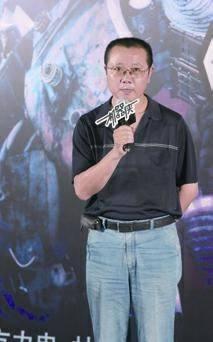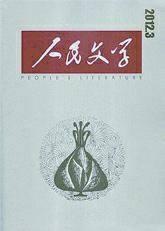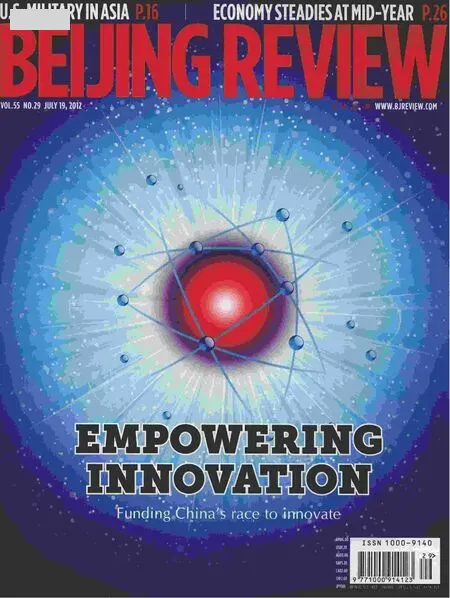An Eye for Sci-Fi
By Tang Yuankai


Chinas fast-growing cityscapes often resemble the setting of a futuristic science fiction novel. But as a genre, science fiction itself has yet to catch on among the countrys mainstream readers.
Recently, Peoples Literature published a series of sci-fi stories written by Chinese writer Liu Cixin in its third issue of 2012. It was only the second time the magazine has focused on the literary genre, and this time it quickly aroused interest.
Peoples Literature, created in October 1949, is Chinas most authoritative mainstream literature magazine. It has since been renowned as the cradle of Chinese writers.
The first time it published a work of science fiction was in 1978. The story was called Dead Coral Island, written by Tong Enzheng in the 1960s.
On the margins
“When I was reading science fiction online, I found a famous author with the same name as yours,” a quizzical coworker told Liu.
Liu, an IT engineer at Niangziguan Power Station in north Chinas Shanxi Province, kept secret his second life as a writer. His colleagues would never guess that the sci-fi author and Liu were the same person. Liu has long been regarded as a leading figure in the Chinese sci-fi community, winning multiple Galaxy Awards, the highest honor in Chinas sci-fi field.
However, he has long kept a low profile. In addition to his reserved personality, Lius obscurity was due to the weak position of science fiction in Chinese literature.
As early as the 1980s, Chinese sci-fi writers had created many excellent works that became popular with readers. But they still felt marginalized and were not invited to literature forums, said Wu Yan, Chairman of the World Chinese Science Fiction Association (WCSFA) and a professor at Beijing Normal University.
The situation has yet to change. For decades, science fiction has been dismissed by literature purists.
Its no surprise, then, that the Peoples Literature issue containing four of Lius science fiction stories as a thematic feature saw an outpouring of overdue attention.
The magazines publishing of Lius works was not done on a whim. While critics exaggerated the difference between so-called traditional mainstream literature and science fiction, there really was no substantial conflict between the two, said Li Jingze, editor-inchief of the magazine.
Li noticed Lius works when he started Pathlight, the English edition of Peoples Literature created to light the path of ChinaWestern cultural exchanges. He was soon hooked by Lius creativity.
Although literature has no exact standards, it does have certain prominent characteristics—namely a brilliant and original imagination, Li added.
Echoes
“Science fiction focuses on the impact of the city, technology and future on the people. This is rare in mainstream literature,” said Han Song, Deputy Director General of the Home News for Overseas Service Department of Xinhua News Agency.
Science fiction as a literature device emerged during the industrial era. Whereas romance, martial arts, detective and fantasy novels are rooted in Chinese history and culture, science fiction sprang out of contemporary life.
The reason Peoples Literature is focused on science fiction is to restore traditions of literature like imagination, storytelling and readability, said Han.
“If we combine these traditions with the modern life in the industrial and postindustrial age, we could see unexpected responses,” said Han.
In fact, Han is also a mysterious sci-fi writer in China. Newsweek once published a story about him. It described his life spent busily working on news reports during the day while moonlighting as a writer of fantasy stories.
In his daily life, Han often unconsciously overlaps his observations with sci-fi imagery.
“News or science fiction—it depends on the perspective of the observer,” said Han. “Changing angles in observations can help me get a better picture.”
Through the lens of science fiction, he takes a critical view of the future and the present. The ultimate purpose is to imagine a better world.
His masterpiece, 2066: Red Star Over America, was completed in 1999. Published two years before the September 11 attacks, it told a story of a terrorist attack causing the collapse of the World Trade Center in New York City, a narrative eerily similar to the events of September 11. The book even predicted the collapse of the global financial system, which would later come true in 2008.
In another work entitled The Subway, Han placed the protagonist in an underground maze. The hero encountered a series of adventures and wonders. Through his experiences, Hans story explored an individuals path through the modernization process.
“Science fiction is a mirror of the real world,” said Han.
Indeed, reflections of reality have been a prominent theme in science fiction.
Science fiction has long been misunderstood. Some critics felt it was not able to accurately present reality or effectively discuss social problems. In truth, the stories attach great importance to reflecting the most acute problems in modern-day life, said Huang Shangen, a columnist.
Sci-fi writers often place the hero in a far-out time and space to allow for various experiments. Through this literary technique, they are able to expose the cruel aspects underlying our current reality, said Huang.
Challenges
In Lis opinion, Chinese sci-fi writers have made great achievements in the past three decades on par with similar foreign masters.
“Science fiction is a global literature phenomenon. The Chinese writers are competing with their foreign peers to see who is more imaginative and whose thinking about the human race is more unique and profound,” said Li.
In recent years, a growing number of scholars have been dedicated to promoting Chinese sci-fi writers at universities, international literature forums and professional journals. David Der-wei Wang, a professor of the Department of East Asian Languages and Civilizations at Harvard University, is a prominent example.
Unfortunately, the language barrier has severely hindered Chinese authors from winning international awards in the field. As noted by American sci-fi writer and critic James Edwin Gunn, a novel without an English edition cannot easily reach a worldwide audience.
Even within China, science fiction has a limited range of readers. Except for Lius Three Body trilogy, which sold 400,000 copies, most sci-fi books have a poor sales volume of several thousand.
In the late 1970s and early 1980s, Chinese science fiction embraced a golden era. However, a wave of criticism around that time condemning science fiction as pseudoscience drove the genre back into relative obscurity. Since then, most of the countrys sci-fi magazines have disappeared.
Fortunately, in the past decade, Chinese science fiction has seen a comeback. “It quickly accomplished what took years in other countries. The only shortcoming was that Chinas group of sci-fi writers was still quite small, with few outstanding ones,” said Yao Haijun, Editor-in-Chief of Science Fiction World, and Secretary General of WCSFA.
Liu offered his own opinion, saying,“Science fiction has a wide variety of styles. We should aim for such diversity, which we are lacking.”
Liu also said science fiction should stick to its roots, arguing that science fiction is surrealistic but not supernatural. It should abide by the laws of science.
In addition to producing outstanding works, finding a good niche market is essential. Due to a limited distribution chain, some of Chinas best sci-fi is not able to reach a wide audience of readers.
Until the industry improves, Liu isnt quitting his day job as an IT engineer, but will continue to write stories in his spare time. “The income from writing science fiction is not enough to make a living. Currently in China there are no more than three sci-fi writers who can make it,” said Liu.
On the bright side, working in IT can allow him to learn about new things, said Liu.
Optimists hold that science fiction has great potential in the Chinese market. Many foreign sci-fi books are selling well in China. Sci-fi movies such as Avatar are very popular among young audiences.
As China achieved two of its biggest scientific missions in June—launching the Shenzhou-9 spacecraft and a record-breaking dive by its state-of-the-art Jiaolong submersible 7,062 meters below the Mariana Trench in the western Pacific Ocean—Chinese onlookers are imagining a future worthy of the very best in science fiction.n

